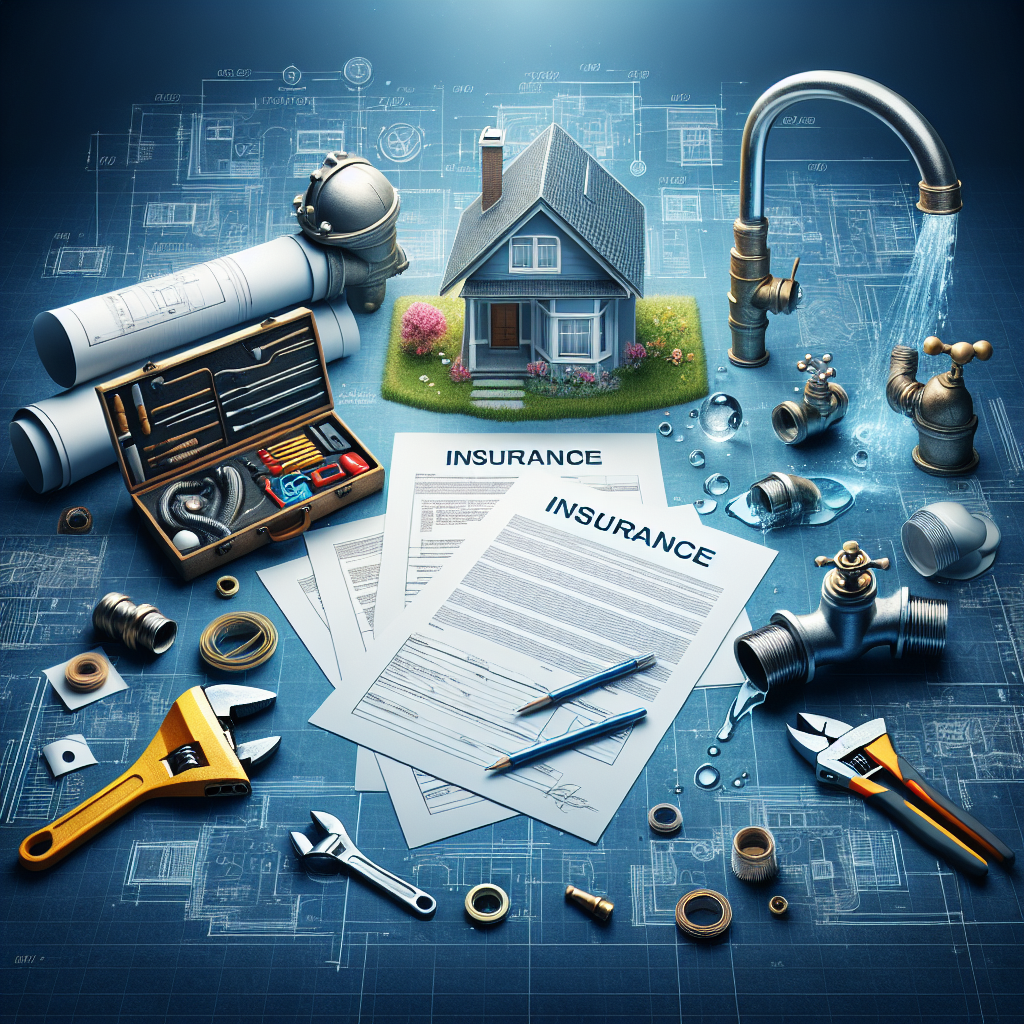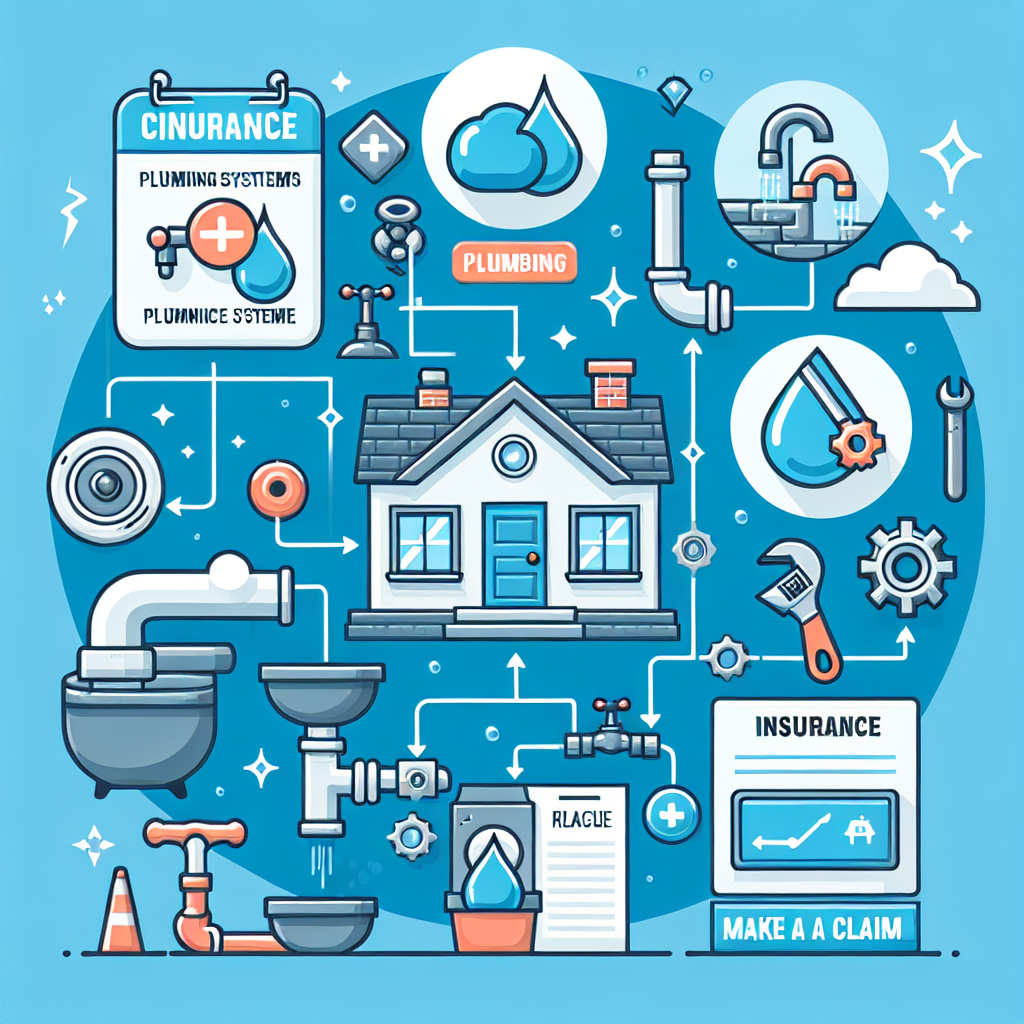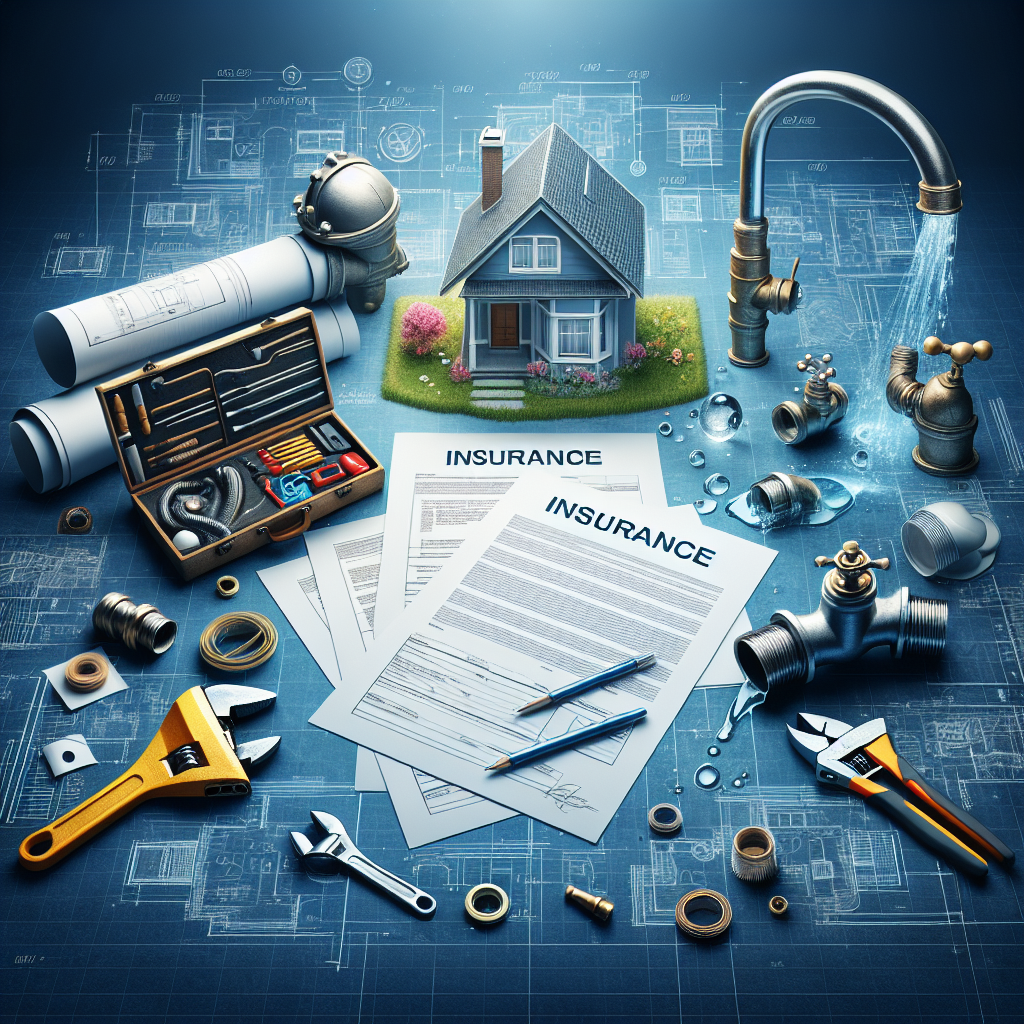Did you know that the condition of your plumbing system can have an impact on your home insurance? It’s true! Your plumbing plays a vital role in maintaining the structural integrity of your home, and insurance providers take this into consideration when determining your coverage and premiums. In this article, we will explore the relationship between plumbing and home insurance, highlighting why it’s important to ensure your plumbing is in good shape to protect your investment.
The Basics of Plumbing
Understanding the Role of Plumbing in Homes
Plumbing plays a crucial role in every home, providing a system of pipes and fixtures that distribute water and remove waste. It is responsible for ensuring that clean water is readily available for daily activities such as bathing, cooking, and cleaning, while also safely disposing of waste water. Without a functioning plumbing system, daily tasks and activities would become extremely challenging.
Different Components of a Plumbing System
A plumbing system consists of several key components that work together to ensure the smooth flow of water. These components include water supply pipes, drains, fixtures, valves, and fittings. The water supply pipes bring clean water from the main water source into the home, while drains remove waste water and direct it to the sewage system or a septic tank. Fixtures, such as faucets and toilets, provide access to water for various purposes. Valves and fittings control the flow and pressure of water throughout the system.
Common Plumbing Issues
While plumbing systems are designed to be durable and reliable, they can still experience problems from time to time. Some common plumbing issues that homeowners may encounter include leaky pipes, clogged drains, running toilets, low water pressure, and water heater malfunctions. These issues can disrupt daily routines and cause damage to the home if not addressed promptly. Understanding how to identify and resolve common plumbing problems can save homeowners time, money, and frustration.
Home Insurance Coverage for Plumbing Systems
Importance of Home Insurance for Plumbing
Home insurance is a crucial investment for homeowners as it provides protection against unexpected events and financial losses. When it comes to plumbing, home insurance coverage can be a lifesaver. It can help cover the costs of repairs or replacements for damaged plumbing systems, as well as any resulting property damage. Without proper insurance coverage, homeowners may be faced with significant out-of-pocket expenses.
Types of Home Insurance Coverage for Plumbing
Home insurance policies typically offer coverage for plumbing systems under the property damage section, although specific coverage can vary depending on the policy. Most standard policies cover sudden and accidental damage to plumbing systems caused by events such as burst pipes, leaking appliances, or water damage from storms. However, it is essential to review the policy details carefully to understand the extent of coverage provided.
Factors Affecting Coverage
Several factors can influence the coverage provided for plumbing systems under a home insurance policy. These factors include the age and condition of the plumbing system, the location of the property, any previous claims history, and the policy’s specific terms and conditions. It is crucial for homeowners to discuss their plumbing system’s details with their insurance provider to ensure they have adequate coverage.

Preventive Measures to Minimize Plumbing Issues
Regular Maintenance and Inspections
One of the best ways to minimize plumbing issues is through regular maintenance and inspections. By scheduling annual or bi-annual inspections with a qualified plumber, homeowners can identify and address potential problems before they escalate. Regular maintenance activities, such as flushing water heaters, cleaning drains, and checking for leaks, can also help maintain the overall health of the plumbing system.
Proper Installation and Upkeep
Proper installation and upkeep are paramount to the longevity and efficiency of a plumbing system. Hiring a licensed and experienced plumber for installations, repairs, and upgrades ensures that everything is properly installed, minimizing the chances of future issues. Additionally, homeowners should be mindful of the products and materials used in their plumbing system, opting for high-quality parts to promote durability.
Efficient Plumbing Practices
Adopting efficient plumbing practices can make a significant difference in the lifespan of the system and reduce the risk of plumbing issues. Simple actions like not pouring grease down the drain, using drain catchers to prevent clogs, and conserving water can help maintain a healthy plumbing system. By being mindful of how we use and care for our plumbing, we can prevent unnecessary problems and potentially lower home insurance premiums.
Home Insurance Claims for Plumbing Problems
The Claims Process
When faced with a plumbing issue that requires making a claim, homeowners must understand the insurance claims process. Typically, the process involves notifying the insurance provider as soon as possible, documenting the extent of the damage, and gathering all necessary evidence to support the claim. It is essential to follow the insurer’s guidelines carefully and provide all requested information to ensure a smooth claims process.
Documentation and Evidence
To support a plumbing insurance claim, homeowners must provide thorough documentation and evidence. This may include photographs or videos of the damaged areas, receipts for repairs or replacements, and detailed descriptions of the incident. The more evidence provided, the stronger the claim becomes.
Common Reasons for Claim Denials
While insurance claims for plumbing problems are generally accepted, there are instances where claims may be denied. Some common reasons for claim denials include lack of coverage for the specific issue, neglect or lack of maintenance on the part of the homeowner, pre-existing conditions, and failure to provide sufficient evidence to support the claim. It is crucial to review the policy terms and conditions and meet all requirements to avoid claim denials.

Finding the Right Insurance Policy for Plumbing Coverage
Considering Different Insurance Providers
Choosing the right insurance policy for plumbing coverage requires careful consideration of various insurance providers. It is essential to compare policies, premiums, coverage limits, and customer reviews to make an informed decision. Seeking recommendations from trusted friends, family, or professionals in the industry can also be valuable in finding reliable insurance providers.
Policy Exclusions and Limitations
Understanding the exclusions and limitations of an insurance policy is crucial to ensure adequate coverage for plumbing systems. Some policies may exclude coverage for specific types of damage or have limitations on coverage amounts. By thoroughly reviewing the policy documents or consulting with an insurance professional, homeowners can have a clear understanding of what is covered and what is not.
Reviewing Coverage Options
Insurance policies often offer different coverage options for plumbing systems, and homeowners should carefully review these options to determine the best fit for their needs. Some policies may offer optional endorsements for extended coverage, such as protection for appliances or additional coverage for water damage. By considering these coverage options, homeowners can tailor their policies to provide comprehensive protection for their plumbing systems.
Additional Coverage Options for Plumbing Issues
Optional Endorsements for Extended Coverage
In addition to standard coverage, homeowners may have the option to add endorsements to their insurance policies for extended coverage. These endorsements may provide protection for specific plumbing-related incidents, such as the failure of a sump pump or damage caused by frozen pipes. Adding these endorsements can provide extra peace of mind and ensure comprehensive coverage for potential plumbing issues.
Water Damage Coverage
Water damage can be a significant concern for homeowners, as plumbing issues can lead to extensive damage to the property. Some insurance policies offer specific coverage for water damage caused by plumbing issues, including the cost of repairs, restoration, and even temporary relocation if necessary. Water damage coverage can be valuable in mitigating the financial and logistical impact of plumbing-related disasters.
Sewer Backup Coverage
Sewer backups can cause significant damage and pose health hazards to homeowners. While standard insurance policies may not include coverage for sewer backup, it is often available as an optional endorsement. Sewer backup coverage can help cover the costs of cleaning, repairs, and replacement of damaged property resulting from a sewer backup event. Homeowners considering this coverage should carefully review the details and limitations of the endorsement.
Steps to Take in Case of Plumbing Emergencies
Addressing Immediate Concerns
In the event of a plumbing emergency, it is crucial to address immediate concerns to prevent further damage. Shutting off the main water supply can help stop the flow of water and minimize the potential for flooding. Additionally, addressing minor issues promptly, such as turning off leaking faucets or clearing clogged drains, can prevent the problem from escalating.
Contacting Emergency Services
For severe plumbing emergencies that pose an immediate threat to safety or property, it is important to contact emergency services right away. Emergency plumbers are available around the clock to provide assistance and quickly resolve critical issues. Timely intervention can help minimize damage and prevent further complications.
Notifying Insurance Provider
After addressing immediate concerns and contacting emergency services, homeowners should promptly notify their insurance provider of the plumbing emergency. This allows the claims process to begin as soon as possible, ensuring that coverage and reimbursements are provided as needed. Providing accurate and detailed information about the incident will facilitate a smoother claims process.
The Role of a Plumber in the Insurance Process
Engaging a Qualified Plumber
When dealing with plumbing issues that require insurance claims, it is essential to engage the services of a qualified plumber. Insurance providers often require professional assessments and reports on the cause and extent of the damage. Hiring a licensed plumber who has experience working with insurance claims can help ensure accurate documentation and facilitate the claims process.
Obtaining Professional Reports
Insurance providers may require professional reports from plumbers to support the plumbing insurance claim. These reports outline the cause of the problem, the extent of the damage, and the recommended repairs or replacements. The accuracy and detail of these reports play a crucial role in the success of the claim, making it essential to work with reputable plumbers who can provide accurate assessments.
Coordinating with Insurance Adjusters
Plumbers can also play a vital role in coordinating with insurance adjusters during the claims process. Adjusters often require additional information or clarification about the plumbing issue to assess the validity of the claim. By collaborating closely with both the homeowner and the insurance adjuster, plumbers can help ensure that claims are properly evaluated and settled.
Factors Impacting Home Insurance Premiums for Plumbing
Age and Condition of Plumbing System
The age and condition of a home’s plumbing system can influence home insurance premiums. Older plumbing systems, especially those made of outdated materials such as galvanized steel, may be more prone to issues and potential damage. Insurance providers may consider these factors when calculating premiums, as older plumbing systems can pose a higher risk for claims.
Location and Regional Risks
The location of a property can also impact home insurance premiums for plumbing coverage. Properties located in areas prone to natural disasters or severe weather events, such as hurricanes or freezing temperatures, may have higher premiums due to the increased risk of plumbing-related damage. Insurance providers assess these regional risks when determining coverage levels and premium amounts.
Previous Claims History
A homeowner’s previous claims history can affect home insurance premiums for plumbing coverage. Multiple claims related to plumbing issues within a short period of time may indicate a higher risk of future claims, potentially resulting in increased premiums. Maintaining a claims-free history or taking steps to prevent recurring plumbing issues can help keep premiums lower.
The Importance of Regular Home Maintenance
Preventing Plumbing Issues
Regular home maintenance plays a critical role in preventing plumbing issues. Simple tasks such as inspecting pipes for leaks, clearing clogged drains, and ensuring proper insulation in colder climates can help identify and address potential problems before they become major issues. By being proactive and addressing minor concerns promptly, homeowners can minimize the chances of expensive repairs and insurance claims.
Ensuring Insurability
Home maintenance is crucial for ensuring the continued insurability of a property. Insurance providers may conduct inspections before issuing or renewing policies, examining the overall condition of the property, including the plumbing system. By maintaining a well-functioning plumbing system and addressing any necessary repairs or upgrades, homeowners can increase the likelihood of securing affordable insurance coverage.
Preserving Property Value
A well-maintained plumbing system contributes to the overall value of a property. Potential buyers often consider the condition of a home’s plumbing when making purchase decisions. Regular maintenance and appropriate repairs help preserve property value by providing assurance that the plumbing system is in good working order. Additionally, maintaining an insurable property can enhance marketability and ease the process of obtaining home insurance coverage.
In conclusion, understanding the relationship between plumbing and home insurance is essential for homeowners. By comprehending the role of plumbing in their homes, being aware of the coverage options available, and implementing preventive measures, homeowners can protect themselves from unexpected plumbing issues. Regular maintenance, swift action during emergencies, and the involvement of qualified professionals all contribute to a smooth insurance claims process. Taking these steps not only ensures the insurability of a property but also supports the preservation of its value.

